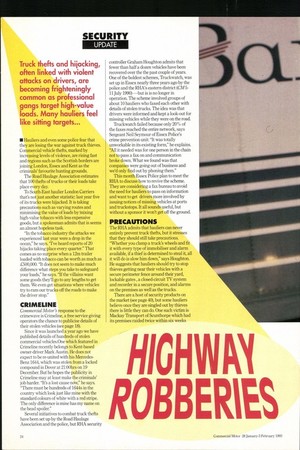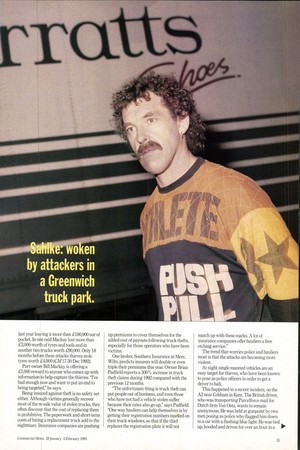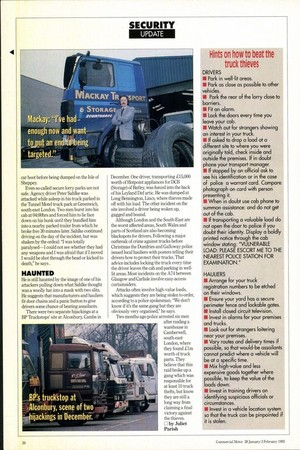HIGHWki ROBBERIES
Page 26

Page 27

Page 28

If you've noticed an error in this article please click here to report it so we can fix it.
Truck thefts and hijacking, often linked with violent attacks on drivers, are becoming frighteningly common as professional gangs target high-value loads. Many hauliers feel like sitting targets...
• Hauliers and even some police fear that they are losing the war against truck thieves. Commercial vehicle thefts, marked by increasing levels of violence, are rising fast and regions such as the Scottish borders are joining London, Essex and Kent as the criminals' favourite hunting grounds.
The Road Haulage Association estimates that 100 thefts of trucks or their loads take place every day.
To South-East haulier London Carriers that's not just another statistic last year five of its trucks were hijacked. It is taking precautions such as varying routes and minimising the value of loads by mixing high-value tobacco with less expensive goods, but a spokesman admits that is seems an almost hopeless task.
"In the tobacco industry the attacks we experienced last year were a drop in the ocean," he says. "I've heard reports of 20 hijacks taking place every quarter." That comes as no surprise when a 12m trailer loaded with tobacco can be worth as much as £500,000. "It does not seem to make much difference what steps you take to safeguard your loads," he says. "If the villains want some goods they'll go to any lengths to get them. We even get situations where vehicles try to ram our trucks off the roads to make the driver stop."
CRIMELINE Commercial Motor's response to the crimewave is Crimeline, a free service giving operators the chance to publicise details of their stolen vehicles (seepage 18).
Since it was launched a year ago we have published details of hundreds of stolen commercial vehicles.One which featured in Crimeline recently belongs to Kent-based owner-driver Mark Austin. He does not expect to be re-united with his MercedesBenz 1644, which was stolen from a locked compound in Dover at 21:00hrs on 19 December. But he hopes the publicity in Crimeline may at least make the criminals' job harder. "It's a lost cause ndw," he says. "There must be hundreds of 1644s in the country which look just like mine with the standard colours of white with a red stripe. The only difference is mine has my name on the head spoiler."
Several initiatives to combat truck thefts have been set up by the Road Haulage Association and the police, but RHA security controller Graham Houghton admits that fewer than half a dozen vehicles have been recovered over the the past couple of years. One of the boldest schemes, Truckwatch, was set up in Essex nearly three years ago by the police and the RHA's eastern district (CM511 July 1990) —but is is no longer in operation. The scheme involved groups of about 10 hauliers who faxed each other with details of stolen trucks. The idea was that drivers were informed and kept a look-out for missing vehicles while they were on the road.
Truckwatch failed because only 20% of the faxes reached the entire network, says Sergeant Neil Seymour of Essex Police's crime prevention unit: "It was totally unworkable in its existing form," he explains. "All it needed was for one person in the chain not to pass a fax on and communication broke down. What we found was that companies were going out of business and we'd only find out by phoning them."
This month Essex Police plan to meet the RHA to discuss how to revive the scheme. They are considering a fax bureau to avoid the need for hauliers to pass on information and want to get drivers more involved by issuing notices of missing vehicles at ports and truckstops. It all sounds useful, but without a sponsor it won't get off the ground.
PRECAUTIONS The RHA admits that hauliers can never entirely prevent truck thefts, but it stresses that they should still take precautions. "Whether you clamp a truck's wheels and fit it with every type of immobiliser and alarm available, if a thief is determined to steal it, all it will do is slow him down," says Houghton. He suggests that hauliers should try to stop thieves getting near their vehicles with a secure perimeter fence around their yard, lockable gates ,a closed-circuit TV system and recorder in a secure position, and alarms on the premises as well as the trucks.
There are a host of security products on the market (see page 40), but some hauliers believe once they are singled out by thieves there is little they can do. One such victim is Mackay Transport of Scunthorpe which had its premises raided twice within six weeks last year lea ,ring it more than £100,000 out of pocket. In oiie raid Mackay lost more than £3,000-worth of tyres and tools and in another two trucks worth £90,000. Only 18 months before these attacks thieves stole tyres worth £4,000 (CM17-30 Dec 1992).
Part owner Bill Mackay is offering a £5,000 reward to anyone who comes up with information to help capture the thieves: "I've i an had enough ow and want to put end to being target d," he says.
Being insured against theft is no safety net either. Although victims generally recover most of the re-sale value of stolen trucks, they often discover that the cost of replacing them is prohibitive. The paperwork and short-term costs of hiring a replacement truck add to the nightmare. Insurance companies are pushing up premiums to cover themselves for the added cost of payouts following truck thefts, especially for those operators who have been victims.
One broker, Southern Insurance at Mere, Wilts, predicts insurers will double or even triple their premiums this year. Owner Brian Padfield reports a 300% increase in truck theft claims during 1992 compared with the previous 12 months.
"The unfortunate thing is truck theft can put people out of business, and even those who have not had a vehicle stolen suffer because their rates also go up," says Padfield. "One way hauliers can help themselves is by getting their registration numbers marked on their truck windows, so that if the thief replaces the registration plate it will not match up with these marks. A lot of insurance companies offer hauliers a free etching service."
The trend that worries police and hauliers most is that the attacks are becoming more violent.
At night single-manned vehicles are an easy target for thieves, who have been known to pose as police officers in order to get a driver to halt.
This happened in a recent incident, on the A2 near Cobham in Kent. The British driver, who was transporting Parcelforce mail for Dutch firm Van Osta, wants to remain anonymous. He was held at gunpoint by two men posing as police who flagged him down in a car with a flashing blue light. He was tied , up, hooded and driven for over an hour in a P car boot before being dumped on the Isle of Sheppey.
Even so-called secure lorry parks are not safe. Agency driver Peter Sahlke was attacked while asleep in his truck parked in the Tunnel Motel truck park at Greenwich, south-east London. Two men burst into his cab at 04:00hrs and forced him to lie face down on his bunk until they bundled him into a nearby parked trailer from which he broke free 30 minutes later. Sahlke continued driving on the day of the incident, but was shaken by the ordeal: "I was totally paralysed—I could not see whether they had any weapons and I was afraid that if I moved I would be shot through the head or kicked to death," he says.
HAUNTED He is still haunted by the image of one of his attackers pulling down what Sahlke thought was a woolly hat into a mask with two slits. He suggests that manufacturers and hauliers fit door chains and a panic button to give drivers some chance of beating assailants.
There were two separate hijackings at a BP Truckstops' site at Alconbury, Cambs in December. One driver, transporting £15,000 worth of Hotpoint appliances for DCB (Storage) of Batley, was forced into the back of his Leyland Daf artic. He was dumped at Long Bennington, Lincs, where thieves made off with his load. The other incident on the site involved a driver being woken up, gagged and bound.
Although London and the South-East are the worst affected areas, South Wales and parts of Scotland are also becoming blackspots for drivers. Following a major outbreak of crime against trucks before Christmas the Dumfries and Galloway police issued local hauliers with posters telling their drivers how to protect their trucks. That advice includes locking the truck every time the driver leaves the cab and parking in welllit areas. Most incidents on the A74 between Glasgow and Carlisle involve easy-access curtainsiders.
Attacks often involve high-value loads, which suggests they are being stolen to order, according to a police spokesman. "We don't know if it's the same gang but they are obviously very organised," he says.
Two months ago police arrested six men after raiding a warehouse in Camberwell, south-east London, where they found .£1m worth of tuck parts. They believe that this raid broke up a gang which was responsible for at least 10 truck thefts, but know they are still a long way from claiming a final victory against the thieves.
by Juliet Parish Hints on how to beat the truck thieves DRIVERS • Park in well-lit areas.
• Park as close as possible to other vehicles.
III Park the rear of the lorry close to barriers.
• Fit an alarm.
• Lock the doors every time you leave your cab.
• Watch out for strangers showing an interest in your truck.
• If asked to drop a load at a different site to where you were originally told, check inside and outside the premises. If in doubt phone your transport manager.
If stopped by an official ask to see his identification or in the case of police a warrant card. Compare photograph on card with person presenting it.
When in doubt use cab phone to summon assistance: and do not get out of the cab.
If transporting a valuable load do not open the door to police if you doubt their identity. Display a boldly printed notice through the cab window stating: "VULNERABLE LOAD: PLEASE ESCORT ME TO THE NEAREST POLICE STATION FOR EXAMINATION."
HAULIERS Arrange for your truck registration numbers to be etched on their windows.
• Ensure your yard has a secure perimeter fence and lockable gates.
• Install closed circuit television.
• Invest in alarms for your premises and trucks.
P Look out for strangers loitering near your premises.
Vary routes and delivery times if possible, so that would-be assailants cannot predict where a vehicle will be at a specific time.
Mix high-value and less expensive goods together where possible, to keep the value of the loads down.
Invest in training drivers on identifying suspicious officials or circumstances.
Invest in a vehicle location system so that the truck can be pinpointed if it is stolen.






















































































